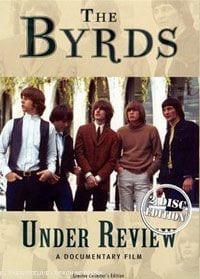
When you read words like, “This DVD is not authorized by all Byrds members or by Columbia Records,” you can’t help but question the product’s authenticity. After all, without the presence of Roger McGuinn, Mr. Jingle-Jangle himself, how can The Byrds saga truly be told? But the Byrds’ story is so multi-faceted; it can be unfolded intriguingly – even without participation of the group’s primary members.
This exhaustive, two-DVD set goes all the way back to the beginning, and even includes clips of McGuinn during his folk, banjo playing days. Ironically, McGuinn has come full circle with his recent return to making folk music. But when McGuinn’s folk roots had that head-on collision with Beatlemania, The Byrds were born.
Some of the Byrds’ early story is common knowledge, and merely repeated with this offering. For instance, McGuinn was the only actual Bryd on their fist hit, “Mr. Tambourine Man”. In the group’s place, LA’s session outfit, the Wrecking Crew, accompanied McGuinn. Even so, guitarist Jerry Cole, who played on that track, knew even then that The Bryds’ sound was going to be something special. But it’s the stories not often told that stand out most. For instance, we learn that Sonny & Cher secretly recorded a Byrds show at Cyros before rushing to record a Byrds-esque, jangle guitar rock version of Bob Dylan’s “All I Really Want to do”. It’s hard to imagine an iconic diva, such as Cher, doing something so sneaky. On the other hand, I’d hardly put it past Sonny Bono. The story goes on to say that The Byrds’ version was a big hit in England, but a failure in America. And for Sonny & Cher, it was the exact opposite.
Although music critics are to be read and not seen (myself included), this set includes a few excellent writers on screen – most notably Johnny Rogan, who has written definitive biographies of both The Smiths and The Byrds. He may have omnipresent sunglasses and bad teeth, but he and Nigel Williamson both express the U.K.’s unusual devotion to The Byrds’ groundbreaking sound. Anthony De Curtis, of Rolling Stone, is also a good fit. I especially like the story De Curtis tells about “Turn, Turn, Turn”. As he recalls, his uncle first heard this song in the Catholic Church and recommended it to him. But De Curtis was hesitant at first, believing it was tainted by this religious association. He later warmed up to it, however, guilt-by-association and all.
In addition to these rock magazine scribes, there is also commentary from various musicians. For example, Van Dyke Parks – an early Byrds associate – recalls how he was offered the chance to produce the first R.E.M. album. And when he first heard their demos, The Byrds immediately came to mind. I’m sure Peter Buck would take that first impression as a compliment. In addition to Parks, we hear from John York (onetime Byrds bassist), Gene Parson (a latter period drummer), fiddler Bryon Berline, and vocalist Vern Gosdin. Toward the end of The Byrds’ run, they were much more country than rock. And York tells a great story about how the Columbia Records executives tried to hide these long haired hippies from the rest of the labels employees, when once The Byrds visited Nashville. And then when Parsons describes Clarence White’s amazing electric guitar skills, it just makes you want to listen again to all the releases on which he appeared.
Bonus features include a segment where Gene Parsons demonstrates the ‘StringBender’ guitar effect he invented especially for Clarence White. There are also extra moments with guitarist Jerry Cole, as well as full slate of contributor biographies.
The saddest part of The Byrds story is that Gene Clark and David Crosby spent so little time in the band. Our music critics explain how they were the group’s best songwriters. Granted, McGuinn’s 12-string Rickenbacker work gave The Byrds their distinctive sound. But early Clark songs, like “I’ll Feel a Whole Lot Better”, proved that they were far more than just a great Dylan covers band.
It’s hard to even imagine folk-rock and country-rock existing without The Byrds. This documentary may not be an essential item for your DVD library, but because The Byrds are essential to rock history, it is more than worth a look.

![Call for Papers: All Things Reconsidered [MUSIC] May-August 2024](https://www.popmatters.com/wp-content/uploads/2024/04/all-things-reconsidered-call-music-may-2024-720x380.jpg)



